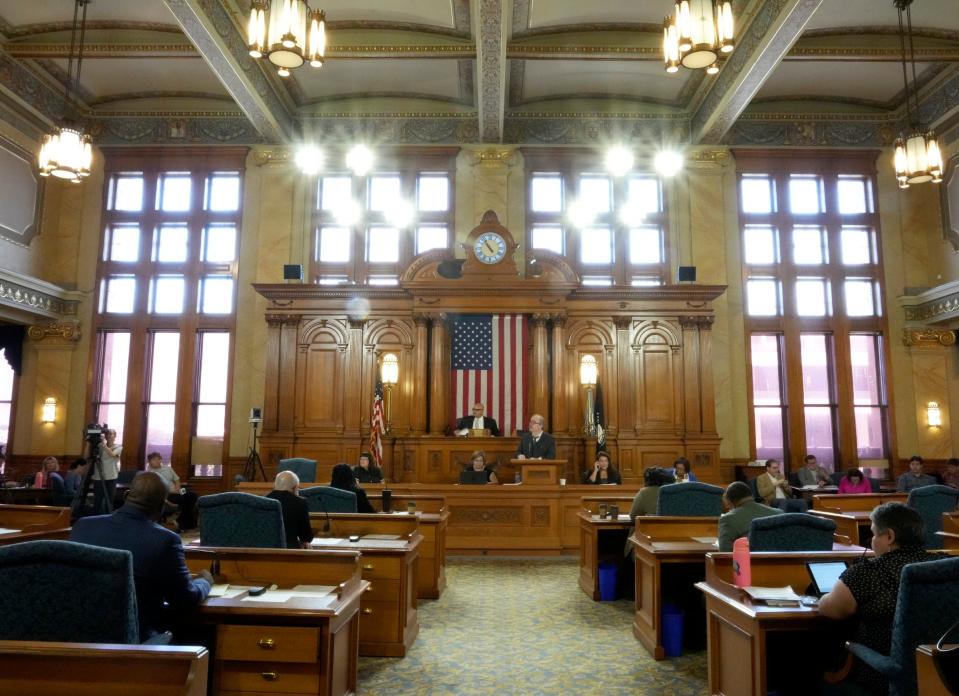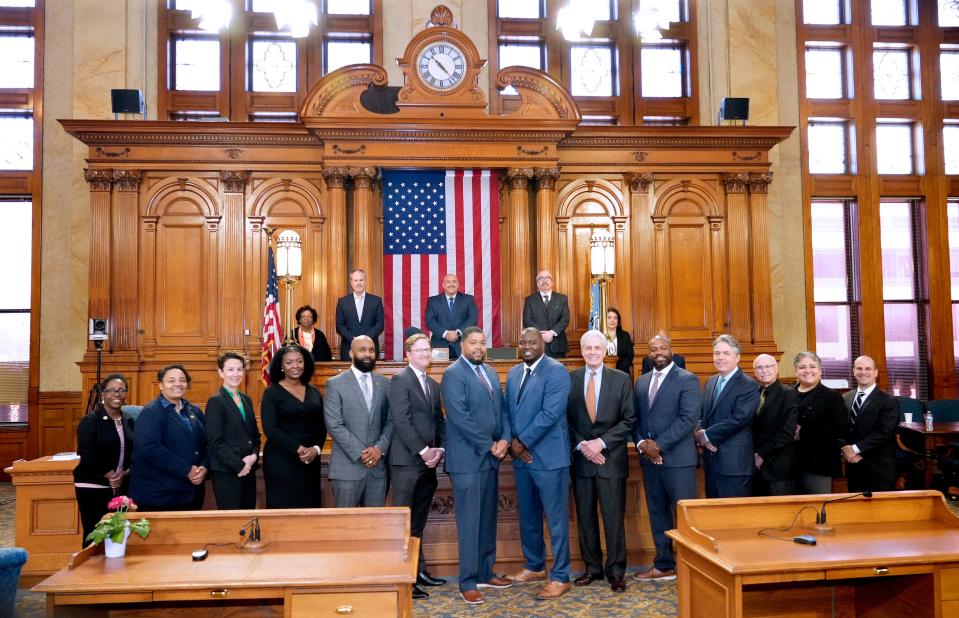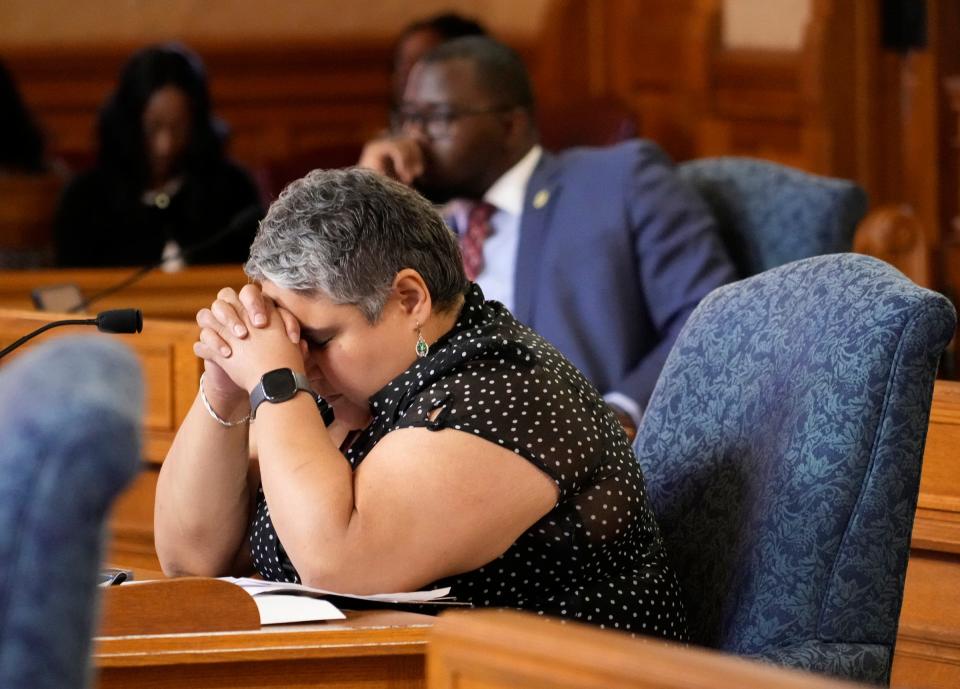Milwaukee Common Council passes 2% sales tax aimed at averting a financial crisis
What began as a tense and unpredictable day at Milwaukee City Hall Tuesday ended with the Common Council's backing of a 2% local sales tax by a wider margin than required.
The critical vote offers the city a new revenue source to avert major service cuts in 2025 even as some council members said it would put additional financial pressure on residents living in poverty.
No part of the process was easy, from the months-long negotiations with elected officials in Madison to local town halls and the debate over a sales tax within the Common Council in the weeks since the state allowed city elected leaders to enact it.
Even walking in Tuesday morning, Common Council President José G. Pérez said he did not know how the vote would go.
He told council members before the vote that the process to reach that point was challenging, unfair and difficult at times.
Afterward, Pérez said he was a bit surprised it passed with more than the minimum 10 votes required. Ultimately, the tax passed with 12 in favor and 3 opposed.
"I knew people were struggling and ... really weighing out the pros and cons, the ramifications, the impact of their vote," he told the Journal Sentinel. "There were discussions just going on to the last minute."

Whether the council had the votes for sales tax was unclear until the end
That struggle persisted even after the council meeting got underway.
For a moment when the sales tax was first brought up, members sat in silence before Ald. Russell Stamper II asked for a recess. That lasted for 45 minutes.
After Common Council President José Pérez asked if there were any questions on the sales tax, the council sat in silence. Ald. Russell Stamper II then asked for a recess. pic.twitter.com/qQw4QuFUYk
— Alison Dirr (@AlisonDirr) July 11, 2023
Voting in favor of the tax were Pérez, Alds. Jonathan Brostoff, Robert Bauman, Lamont Westmoreland, Khalif Rainey, JoCasta Zamarripa, Larresa Taylor, Michael Murphy, Mark Borkowski, Scott Spiker, Marina Dimitrijevic and Stamper.
Alds. Andrea Pratt, Mark Chambers Jr. and Milele Coggs voted against the tax.
After the vote, Bauman said the decision was not difficult.
"At the end of the day the need was so clearly obvious in terms of additional revenue that there was no other option," he said.
He also said the city was looking to sue over the policy provisions included in the new state law that enabled the local sales tax, highlighting mandates targeting the Fire and Police Commission and requiring the reintroduction of school resource officers to Milwaukee Public Schools.
"We have been briefed in closed session by outside attorneys who are, shall I say, itching to take on some of these measures," Bauman told the Journal Sentinel.
Even when pressed, Mayor Cavalier Johnson declined to say whether he would support any lawsuits.
Before the vote, Pratt described her experience making less than $20,000 a year as a paraprofessional in Milwaukee Public Schools, and how the annual impact of a sales tax, equivalent to more than half of a paycheck, would have been devastating for her and her family.
"I do not want to see us fail. I also do not want to save the city by sacrificing its citizens," Pratt said, explaining her vote.
The decision came after a series of town hall meetings, one held by six council members from the city's north side last week that drew a crowd of about 90 people most of whom were vehemently opposed to the tax. Another held by three south side council members was smaller and anything but contentious, while another held by Westmoreland Monday night saw more public resistance to the tax.
On Tuesday, the six council members who hosted the joint town hall split on whether to implement the tax, with Rainey, Taylor and Stamper voting in favor, while Pratt, Chambers and Coggs opposed it.
Rainey cited the massive service cuts the city was facing as the reason behind his 'yes' vote, saying he had made up his mind a while ago.
"It was a challenging vote, but with everything in front of us, it was hard, but it was kind of easy as well," he said.
Stamper said he called the recess to better understand how council members were planning on voting. He said that he did not make up his mind to vote for the sales tax until after the recess was over.
Johnson, a key negotiator for the tax in Madison along with Pérez, will sign the legislation in the coming days. He called the vote "historic" even as he declined to commit to not proposing cuts in the 2024 budget.
"Today, the Common Council took a very important and extraordinary vote, a vote that I think is probably on par with the vote to adopt the city charter," Johnson told reporters.
Sales tax option comes after months of negotiation
That Milwaukee even has the option to implement a sales tax is the product of months-long negotiations between local officials, Republicans in control of the state Legislature and Democratic Gov. Tony Evers.
What resulted was a sweeping local government funding bill that Evers signed into law last month boosting funding for communities across the state but also implementing myriad controversial policy changes, including a number specifically aimed at Milwaukee.
More: Sales tax could help Milwaukee but new state law also comes with steep costs. Here's how.
A similar decision is also before the Milwaukee County Board of Supervisors, which the law empowered to add a 0.4% sales tax on top of the county's existing 0.5% sales tax in order to avert serious fiscal challenges. The County Board's Committee of the Whole on Tuesday heard reports on the fiscal and policy provisions in the law that affect the county and allowed the public to speak at a public hearing.
If both the city sales tax and the increased county sales tax pass by two-thirds votes of their governing bodies, the total sales tax in the city of Milwaukee would be 7.9%, accounting for the existing 5% state sales tax.
The new state law has been controversial, however, because of the series of policy changes aimed at Milwaukee, which seven council members have slammed as "overreaching, micromanaging, and frankly racist."
Those policies take curtail funding for diversity, equity and inclusion in addition to the city's streetcar while also removing power from the Fire and Police Commission, returning police officers to Milwaukee Public Schools and requiring minimum police and fire staffing under threat of losing many millions of dollars.
Those provisions go into effect regardless of whether the council approved a city sales tax.
Council members have introduced legislation opposing the policies and seeking ways to blunt their effects. The resolutions, which the council also backed Tuesday, explore potential litigation, express opposition to the policy initiatives, seek funding for streetcar expansions and more.
The council sent a measure back to committee that would have sent up to $781,220 of federal pandemic aid to the Office of Equity and Inclusion and the Office of African American Affairs.

Even as the new law offers the city a financial lifeline — potentially $200 million-plus in new revenue annually, with the sales tax — it also comes with significantly increased costs for public safety and the city's annual pension payments.
Milwaukee's fiscal challenges have been caused by the state's decision to return a stagnant amount of shared revenue to the city for more than two decades and state-imposed limits on local governments' ability to raise revenue through other means such as sales taxes or by increasing property taxes. At the same time, the city's annual pension contribution is spiking while other costs are rising and reserves are dwindling, including the nearly $400 million Milwaukee received in pandemic aid.
The state estimates the sales tax could bring in approximately $193.6 million in additional revenue in 2024, which would have to be used for its pension and, over 10 years, increasing the number of police and firefighters the city employs to meet state-imposed minimums.
The law also boosts the shared revenue the city receives by about $21.7 million in 2024 — for an expected total of $239.2 million. That increase in shared revenue must be used for law enforcement, fire protection, emergency medical services, emergency response communications, public works, courts and transportation, except for administrative services, the law states.
Johnson's administration expects that the sales tax would allow the city to only maintain current services besides police and fire staffing, which the law requires the city to not just maintain but to increase over the next decade.
In late June, the council's Steering and Rules Committee recommended approval of the tax, with six in favor and two abstaining.
Pérez along with Bauman, Murphy, Dimitrijevic, Spiker and Borkowski voted to recommend the tax while Coggs and Stamper abstained, citing the need to further discuss the issue with residents in their districts.
Vote not a cause for celebration, city officials say
After the vote, Fire Chief Aaron Lipski said he was pleased the department would be able to focus on adding capacity for the first time in over a decade. At the same time, he expressed frustration with the policy provisions attached to the new law and urged the city to file a lawsuit against the state.
"It may sound as if now I should just do backflips and celebrate," Lipski said. "The opposite is true because the entire city is trying to dig out of a hole right now."
When asked about the specific changes in the state law, Lipski said he did not need the provisions that stripped the Fire and Police Commission of most of its power to remain in effect. He described the commission as "the most coherent, functional, forward-thinking, organized board of commissioners I've ever worked for."
At the same time, he spoke favorably of the daily staffing minimum of 218 for the Fire Department stipulated in the law, which would require the hiring of more than 90 firefighters over the next 10 years.
Johnson said no elected official wants to institute a tax but that it was necessary to deal with "political reality" in Madison.
He said he understood that the sales tax could put additional financial pressure on residents living in poverty but added, "Those same constituents, those same community members who live in those neighborhoods, they depend on our city services the most."

Another town hall session generates opposition to a sales tax
More than 70 attendees, most expressing their opposition to the tax, turned out for another town hall Monday night, hosted by Westmoreland at the Wellpoint Care Network Training Center at 8901 W. Capitol Drive.
The meeting opened with a presentation on the looming pension gap by city Budget Director Nik Kovac, followed by comments from Jim Bohl, the former council member for Westmoreland's district and the city's top lobbyist.
At Westmoreland's urging, Bohl used his platform to address comments made at the north side town hall last week urging city leaders to embrace bankruptcy as a way to settle the city's financial affairs without accepting provisions Republicans attached to state legislation that boosted shared revenue to the city and enabled a sales tax.
Bohl shared his experience traveling to Detroit — which went bankrupt in 2013 — with a group of council members in 2017. He described that city as having no consistent trash pickup or snow plowing, neighborhoods with greater than 50% vacancy rates on homes, and that more than 40% of streetlights in the city were out.
"It was like hitting the gas on the problems that had already occurred," Bohl described.
Despite Bohl's dire description, most of the attendees who rose to speak expressed their opposition to the sales tax, though there were more vocal supporters than in last week's town halls. A consistent theme was a feeling people had been abandoned by elected officials and a desire to see action in response to the numerous restrictions imposed on Milwaukee in the state legislation.
Alan Chavoya, who is the outreach chair for the Milwaukee Alliance Against Racist and Political Repression, described the shared revenue bill as "one of the worst deals we've ever seen," to a round of applause. Chavoya, a professor at Milwaukee Area Technical College, credited diversity and inclusion programs for allowing him to become a professor.
"You were sold a wooden nickel," he told a group of city officials, including Westmoreland, Kovac, Bohl, and Mayor Cavalier Johnson. "And you paid as if it was a golden nickel."
Kentarius Newell spoke in support of the tax, saying that he wanted to see it passed for Milwaukee to grow. But like other speakers Monday night, he said Milwaukee wasn't getting a fair deal — arguing the state's largest city generates commerce not matched by the revenue the state returns to Milwaukee.
Newell specifically cited the elimination of residency requirements for police officers as a problem for the city, since those employees receive salaries from the city and benefit from its pension but pay property taxes in surrounding municipalities.
"Milwaukee had been putting the southeastern part of the state on its back for the past two decades," he said. "We are tired of being robbed by the state of Wisconsin."
For Michelle Bryant, who lives in Westmoreland's district, the idea that the council should take the deal to "live to fight another day," as Fire Chief Aaron Lipski told the crowd Monday night, fundamentally misunderstood the problem.
"The problem is, Black folks aren't living. When you look at the data points in this city, we're not living," Bryant, who is Black, said.
Bryant, chief of staff for state Sen. Lena Taylor, voiced frustration about the amount of money that is dedicated to funding police as the state legislation is structured.
More: More than half of 3,000 city workers who moved outside Milwaukee are police and fire staff
"I can't take my money to help myself, but I can take my money to help a police officer who don't even live in my community?" she asked incredulously, to applause.
Westmoreland drew murmurs of disapproval when he declared he was committed to voting in favor of the sales tax.
"At the end of the day, what it came down to me, the question that I asked myself was, 'do I want to live in a city that will cut police?'" Westmoreland said after the meeting. He described how a delayed response for police might prevent EMTs from providing care at crime scenes, and that could lead to deaths.
"I have lost so much sleep over this," Westmoreland said. "I can't wait until it is over."
Alison Dirr can be reached at [email protected]. Nathaniel Rosenberg can be reached at [email protected].
THANK YOU: Subscribers' support makes this work possible. Help us share the knowledge by buying a gift subscription.
DOWNLOAD THE APP: Get the latest news, sports and more
This article originally appeared on Milwaukee Journal Sentinel: Milwaukee Common Council passes 2% sales tax
